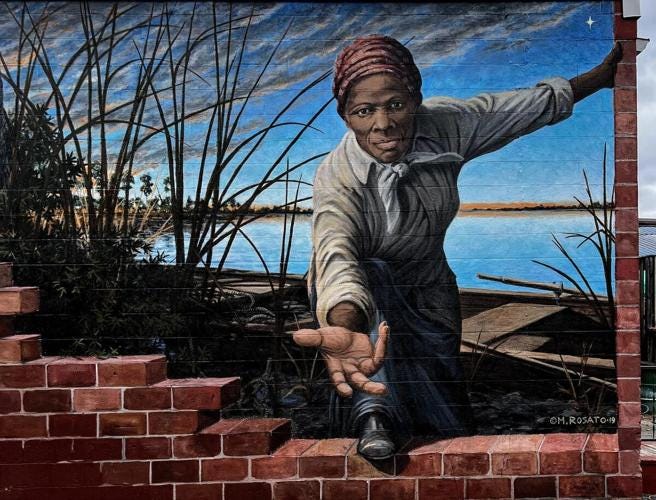
What’s good everyone,
This past week has been an interesting one of communing with the ancestors.
Ever since reading Tricia Hersey’s Rest is Resistance, I have been inspired by and have wanted to learn from Harriet Tubman as an exemplar of Notes of Rest. Hersey regards her as a patron saint of rest, for Tubman is a fellow Black woman whom God led to subversively resist the death-dealing marriage of white supremacy and capitalism that birthed chattel slavery. Not only did Tubman practice sanctuary herself (one of my notes of rest), she invited others into that practice too, in so doing collectively stealing away to Jesus by fleeing North.
Professor Tiya Miles just wrote a new book on Harriet Tubman called Night Flyer: Harriet Tubman and the Faith Dreams of a Free People that I’ve used to learn more about Tubman as an ancestral interlocutor in my Notes journey. I cannot recommend this text highly enough. Miles does an excellent job culling the historical records of Harriet’s life and the life of other Black holy women around her from the 19th century (e.g., Jarena Lee, Julia Foote, Old Elizabeth) to paint a picture of Harriet’s spiritual outlook on the world. Man Harriet was a fierce activist, going so far as to even say that she intended to have death or liberty, and that if she had to die, God would let them kill her. Lord have mercy.
Last Sunday I incorporated Tubman into Notes of Rest at the Practice Church, a mostly White contemplative Protestant congregation in suburban Chicago. The church was investigating the communion of the saints, seeking to learn from past luminaries of the faith who were still talking to us today. It was a rich time connecting Harriet to various people of Scripture and inviting us to listen through the biblical texts, Miles’ archival work, and my music. Together we listened for Harriet to speak to us today amidst our current forms of enslavement. I left that service thinking that this conversation with Harriet is just getting started.
I invite you to grow quiet, close your eyes, and ask Harriet Tubman to speak to you. Do you hear her saying something about how you should resist? Hold your pain before God. (Sonya Massey! Gaza!) Hold your hope before God. In the presence of God, may you and Harriet converse.
Yesterday I was at Alex Haley farm in Clinton, Tennessee, a special place of communing with ancestors. I was there working as a consultant and project manager with the boutique consultancy Fearless Dialogues. We help clients move with less fear in their lives, and in this case were partnering with the NBA Foundation and Children’s Defense Fund to support HBCU students and graduates who were interning in various markets of the NBA. We ended our summer on these historic grounds once owned and cultivated by Alex Haley, who wrote Malcolm X’s autobiography and Roots, and now owned by Children’s Defense Fund, who uses it to train leaders in child advocates from around the country.
Part of what fascinates me about the farm (which is only a farm in name, though functionally is a retreat complex), is that even though it has been owned by Black folk and centers Black art and life, currently the two main caretakers of the grounds are White - Ken and Mike. I have been thankful to get to know both of them over the years. They are thoughtful, caring, and humble White men, carrying a kind of softness I am thankful to see more of in White men (let alone Southern White men).
Though I have known Ken for some time, I was surprised to hear him tell the 68 Black interns that he sits with a few African sculptures to commune with Mother Africa and an African elder. He said this both reverently and casually.
In retrospect, it shouldn’t have surprised me. Even though I have typically heard about communing within Black contexts, communing is just happening more across the board, as all kinds of people open themselves up to the past. I am excited for music and theology to be channels of that time travel backwards and forwards. As America’s birthrate declines, more people are becoming ancestors than are becoming descendants. To that end, I wonder how music and faith will connect us to those who keep slipping on into the future. What do you think?
Here’s to the past.
abundantly,
Julian
P.S. As an aside, I’m interested in the (coincidental?) inverse correlation in the US between the wane of Protestantism on the one hand, which is typically uninterested or opposed to ancestral veneration, and the rise of ancestral veneration and communing on the other. Having grown up Protestant and still claiming to be one, I find that an ironic, tragic miss given ancestral communing was common throughout the life of the biblical story, including Jesus talking with Moses and Elijah.
What’s Next
August 10 The JuJu Exchange at San Jose Jazz Fest
August 16 The JuJu Exchange at Schuba’s (Chicago)
August 17 The JuJu Exchange at Alternating Current Fest (Davenport, Iowa)
August 23 Keyon Harrold at Trinity United Church of Christ (Chicago)
August 24 Isaiah Collier and the Chosen Few (New York)
August 28 Julian Davis Reid’s Circle of Trust at Dorian’s (Chicago)
August 29 Hanah Jon Taylor at Elastic Arts (Chicago)
August 30 Isaiah Collier and the Chosen Few at Spot Lite (Detroit)
—
Standing Exhibit: Creative Community Care Residency (Houston)





Hey, Julian. This is one of my favorites of all your writing because the connections you are making here are exciting to me. I'd never considered Harriet Tubman a saint in the context of canonical sanctification, but it makes sense. Music the way you're doing it is personal and creative and feeds people; it is not harnessed by a capitalist system, and a harness is a yoke, and being yoked is to be a slave. I will ponder this. Thanks, Julian.